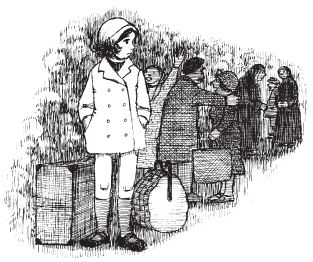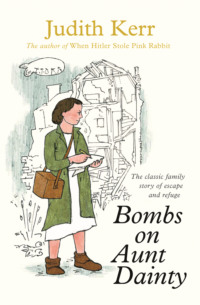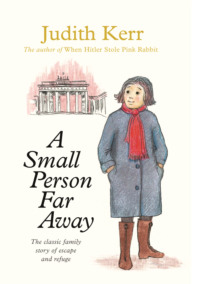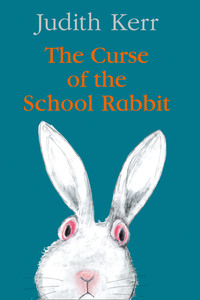
Полная версия
Out of the Hitler Time trilogy: When Hitler Stole Pink Rabbit, Bombs on Aunt Dainty, A Small Person Far Away
Max nodded.
“It may seem like a lot to ask,” said Papa, “but I think it’s worth it because the Jews are wonderful people and it’s rather splendid to be one. And when Mama and I come back I’m sure we’ll be very proud of the way you have represented us in Switzerland.”
It was funny thought Anna. Normally she hated to be told that she must be extra good, but this time she did not really mind. She had not realized before that being a Jew was so important. Secretly she resolved really to wash her neck with soap each day while Mama was away so that at least the Nazis would not be able to say that Jews had dirty necks.
However, when Mama and Papa actually left for Paris she did not feel important at all – just rather small and forlorn. She managed not to cry while she watched their train pull out of the local station, but as she and Max walked back slowly to the inn she felt quite clearly that she was too young to be left in one country while her parents went off to a different one.
“Come on, little man,” said Max suddenly, “cheer up!” – and it was so funny to be addressed as “little man”, which was what people sometimes called Max, that she laughed.
After this things got better. Frau Zwirn had cooked her favourite lunch and it was rather grand for her and Max to eat it in the dining room at a table all by themselves. Then Vreneli came to collect her for afternoon school and after school she and Max played with the three Zwirn children just as usual. Bedtime, which she had thought would be the worst bit, was actually very nice because Herr Zwirn came in and told them funny stories about some of the people who came to the inn. Next day she and Max were able to write quite a cheerful postcard to Mama and Papa, and one arrived for them from Paris the following morning.
After this life went along quite briskly. The postcards were a great help. Each day they either wrote to Mama and Papa or heard from them, and this made it feel as though Mama and Papa were not so far away. On Sunday Anna and Max and the three Zwirn children went into the woods to collect sweet chestnuts. They brought back great baskets full and Frau Zwirn roasted them in the oven. Then they all ate them for supper in the Zwirns’ kitchen, spread thickly with butter. They were delicious.
At the end of the second week after Mama and Papa’s departure Herr Graupe took Anna’s class on an excursion into the mountains. They spent a night high up on a mountainside, sleeping on straw in a wooden hut, and in the morning Herr Graupe got them up before it was light. He walked them along a narrow path up the mountain and suddenly Anna found that the ground under her feet had become cold and wet. It was snow.
“Vreneli, look!” she cried, and as they looked at it the snow which had been dimly grey in the darkness suddenly became brighter and pinker. It happened quite quickly and soon a rosy brilliance swept across the entire mountainside.
Anna looked at Vreneli. Her blue sweater had turned purple, her face was scarlet and even her mouse-coloured plaits glowed orange. The other children were equally transformed. Even Herr Graupe’s beard had turned pink. And behind them was a huge empty expanse of deep pink snow and slightly paler pink sky. Gradually the pink faded a little and the light became brighter, the pink world behind Vreneli and the rest divided itself into blue sky and dazzling white snow, and it was fully daylight.
“You have now seen the sunrise in the Swiss mountains – the most beautiful sight in the world,” said Herr Graupe as though he personally had caused it to happen. Then he marched them all down again.
It was a long walk and Anna was tired long before they got to the bottom. In the train on the way back she dozed and wished that Mama and Papa were not in Paris so that she could tell them about her adventure. But perhaps there would soon be news of their return. Mama had promised that they would only stay away three weeks at the most and it was now a little more than two.
They did not get back to the inn until evening. Max had held back the regular postcard of the day and, tired as she was, Anna managed to cram a lot on it about her excursion. Then, although it was only seven o’clock, she went to bed.
On her way upstairs she came upon Franz and Vreneli whispering together in the corridor. When they saw her they stopped.
“What were you saying?” asked Anna. She had caught her father’s name and something about the Nazis.
“Nothing,” said Vreneli.
“Yes, you were,” said Anna. “I heard you.”
“Pa said we weren’t to tell you,” said Vreneli unhappily.
“For fear of upsetting you,” said Franz. “But it was in the paper. The Nazis are putting a price on your Pa’s head.”
“A price on his head?” asked Anna stupidly.
“Yes,” said Franz. “A thousand German marks. Pa says it shows how important your Pa must be. There was a picture of him and all.”
How could you put a thousand marks on a person’s head? It was silly. She determined to ask Max when he came up to bed but fell asleep long before.
In the middle of the night Anna woke up. It was quite sudden, like something being switched on inside her head, and she was immediately wide awake. And as though she had been thinking of nothing else all night, she suddenly knew with terrible clarity how you put a thousand marks on a person’s head.
In her mind she saw a room. It was a funny-looking room because it was in France and the ceiling, instead of being solid, was a mass of criss-crossing beams. In the gaps between them something was moving. It was dark, but now the door opened and the light came on. Papa was coming to bed. He took a few steps towards the middle of the room – “Don’t!” Anna wanted to cry – then the terrible shower of heavy coins began. It came pouring down from the ceiling on to Papa’s head. He called out but the coins kept coming. He sank to his knees under their weight and the coins kept falling and falling until he was completely buried under them.
So this was what Herr Zwirn had not wanted her to know. This was what the Nazis were going to do to Papa. Or perhaps, since it was in the paper, they had already done it. She lay staring into the darkness, sick with fear. In the other bed she could hear Max breathing quietly and regularly. Should she wake him? But Max hated being disturbed in the night – he would probably only be cross and say that it was all nonsense.
And perhaps it was all nonsense, she thought with a sudden lightening of her misery. Perhaps in the morning she would be able to see it as one of those silly night fears which had frightened her when she was younger – like the times when she had thought that the house was on fire, or that her heart had stopped. In the morning there would be the usual postcard from Mama and Papa, and everything would be all right.
Yes, but this was not something she had imagined – it had been in the paper …Her thoughts went round and round. One moment she was making complicated plans to get up, take a train to Paris and warn Papa. The next moment she thought how silly she’d look if Frau Zwirn should happen to catch her. In the end she must have fallen asleep because suddenly it was daylight and Max was already half-dressed. She stayed in bed for a moment, feeling very tired and letting the thoughts of the previous night come creeping back. After all they seemed rather unreal now that it was morning.
“Max?” she said tentatively.
Max had an open textbook on the table beside him and was looking at it while he put on his shoes and socks.
“Sorry,” said Max. “Latin exam today and I haven’t revised.” He went back to his book, murmuring verbs and tenses. Anyway, it didn’t matter, thought Anna. She was sure everything was all right.
But at breakfast there was no postcard from Mama and Papa.
“Why do you think it hasn’t come?” she asked Max.
“Postal delay,” said Max indistinctly through a mouthful of bread. “Bye!” and he rushed to catch his train.
“I daresay it’ll come this afternoon,” said Herr Zwirn.
But she worried about it all day at school and sat chewing her pencil instead of writing a description of the sunrise in the mountains.
“What’s the matter with you?” said Herr Graupe. (She usually wrote the best compositions in the class.) “It was beautiful. You should have been inspired by the experience!” And he walked away, personally offended by her lack of response to his sunrise.
There was still no postcard when she came home from school, nor was there anything in the last post at seven o’clock. It was the first time that Mama and Papa had not written. Anna managed to get through supper thinking cool thoughts about postal delays, but once she was in bed with the light out all the terror of the previous night came flooding back with such force that she felt almost choked by it. She tried to remember that she was a Jew and must not be frightened, otherwise the Nazis would say that all Jews were cowards – but it was no use. She kept seeing the room with the strange ceiling and the terrible rain of coins coming down on Papa’s head. Even though she shut her eyes and buried her face in the pillow she could still see it.
She must have been making some noise in bed for Max suddenly said, “What’s the matter?”
“Nothing,” said Anna, but even as she said it she could feel something like a small explosion making its way up from her stomach towards her throat, and suddenly she was sobbing, “Papa …Papa …” and Max was sitting on her bed and patting her arm.
“Oh, you idiot!” he said when she had explained her fears. “Don’t you know what is meant by a price on someone’s head?”
“Not …not what I thought?” said Anna.
“No,” said Max. “Not at all what you thought. Putting a price on a person’s head means offering a reward to anyone who captures that person.”
“There you are!” wailed Anna. “The Nazis are trying to get Papa!”
“Well, in a way,” said Max. “But Herr Zwirn doesn’t think it’s very serious – after all there’s not much they can do about it as Papa isn’t in Germany.”
“You think he’s all right?”
“Of course he’s all right. We’ll have a postcard in the morning.”
“But supposing they sent someone after him in France – a kidnapper or someone like that?”
“Then Papa would have the whole of the French police force to protect him.” Max assumed what he imagined to be a French accent. “Go away, pleeze. Ees not allowed to keednap in France. We chop off your head with the guillotine, no?”
He was such an awful mimic that Anna had to laugh and Max looked surprised at his success.
“Better go to sleep now,” he said, and she was so tired that very soon she did.
In the morning instead of a postcard they had a long letter. Mama and Papa had decided that they should all live in Paris together and Papa was coming to collect them.
“Papa,” said Anna after the first excitement of seeing him safe and sound had worn off. “Papa, I was a bit upset when I heard about the price on your head.”
“So was I!” said Papa. “Very upset.”
“Were you?” asked Anna, surprised. Papa had always seemed so brave.
“Well, it’s such a very small price,” explained Papa. “A thousand marks goes nowhere these days. I think I’m worth a lot more, don’t you?”
“Yes,” said Anna, feeling better.
“No self-respecting kidnapper would touch it,” said Papa. He shook his head sadly. “I’ve a good mind to write to Hitler and complain!”
Chapter Twelve

Frau Zwirn packed the children’s clothes. They said goodbye to their friends and their teachers at school and then they were ready to leave Switzerland for their new life in France. But it wasn’t a bit like leaving Berlin, said Anna, because they would be able to come back and see everyone at the Gasthof Zwirn any time they liked, and Herr Zwirn had already invited them for next summer. They were to live in a furnished flat in Paris which Mama was busy now getting ready. What was it like? Max wanted to know. Papa thought for a moment. If you stood on the balcony, he said at last, you could see the Eiffel Tower and the Arc de Triomphe both at the same time – these were famous Paris landmarks. But beyond this he seemed unable to remember much about it. It was a pity, thought the children, that Papa was sometimes so vague about practical matters. But the fact that the flat had a balcony made it sound rather grand.
The journey to Paris took the whole day and they almost did not get there at all. They had no trouble until Basle, but there they had to change trains because Basle is the frontier between Switzerland, France and Germany. Owing to some delay on the line they arrived very late and only had a few minutes to catch their Paris connection.
“We’ll have to be very quick,” said Papa as the train drew into the station.
Luckily there was a porter immediately at hand. He grabbed their luggage and flung it on to his wheelbarrow.
“The Paris train! Hurry!” cried Papa and the porter set off at a gallop with them all running behind him. Anna had trouble keeping the porter in sight as he turned and twisted through the crowds of people, and Max and Papa were already helping him to heave the luggage aboard the other train when she caught up with them. She stood for a moment, getting her breath back. The train must be just about to leave, for all along it people were leaning out of the windows saying goodbye to their friends on the platform. Immediately beside her a young man seemed in danger of falling right out as he gave his girlfriend a passionate farewell embrace.
“Go on with you!” said the girl and gave him a little push back into the train. As he straightened up, the bottom of the window came into view. There was a printed notice stuck on it. It read STUTTGART.
“Papa!” screamed Anna. “This is the wrong train! It’s going to Germany!”
“Good God!” said Papa. “Get the luggage off, quick!”
He and Max dragged the suitcases off again as fast as they could. Then they heard the whistle.
“Never mind!” shouted Papa and pulled Max back, even though there was a suitcase still left on the train.
“That’s our case!” shouted Max. “Please give us our case!” and just as the carriage began to move the young man with the girlfriend kindly pushed it on to the platform for them. It landed at Anna’s feet and they stood there, with luggage littered all round them, and watched the train steam out of the station.
“I clearly told you the Paris train!” said Papa, angrily looking round for the porter. But there was no sign of him. He had disappeared.
“If we’d got on that train,” asked Anna, “would we have been able to get off before it got to Germany?”
“Possibly,” said Papa. “If we’d realized it was the wrong train.” He put an arm round her shoulders. “I’m certainly very glad you noticed before we ever got on it.”
It took some time to find another porter and Papa was sure they had missed the Paris connection, but in fact they caught it with time to spare. Its departure time had been put back to fit in with the delay on the Swiss line. It was odd that the first porter had not known about this.
As they sat in their compartment waiting for the French train to start Max suddenly said, “Papa, do you think that porter took us to the wrong train on purpose?”
“I don’t know,” said Papa. “It could just have been a mistake.”
“I don’t think it was a mistake,” said Max. “I think he was trying to earn the thousand marks on your head.”
For a moment they sat thinking about it, and about what would have happened if they had travelled to Germany. Then the whistle went and the train started with a jolt.
“Well,” said Papa, “if that porter really was trying to earn a thousand marks he certainly made a bad bargain. I never had time even to give him a tip.” He smiled and settled back in his seat. “And in a few minutes, thanks to Anna, we’ll be not in Germany but in France. And thanks to Max we’ve even got all our luggage.” He lifted his hands in mock admiration. “Psssh!” said Papa. “What clever children I have!”
They arrived in Paris after dark and very tired. Anna had already sensed something different in the train after leaving Basle. There had been more French voices talking quickly, sharply and incomprehensibly. The smells from the dining-car had been different too. But now that she was standing on the platform in Paris she was overwhelmed.
All round her there were people shouting, greeting each other, talking, laughing. Their lips moved quickly, their mobile faces keeping pace with them. They shrugged, embraced each other and waved their hands to emphasize what they were saying – and she could not understand a word. For a moment, in the dim light and the noise and the steam drifting back from the engine, she felt quite lost. But then Papa was bundling her and Max into a taxi and they were charging through the crowded streets.
There were lights everywhere, people walking along wide pavements, eating and drinking in the glass-fronted cafés, reading newspapers, looking into shop windows. She had forgotten a big city was like this. The height of the buildings amazed her, and the noise. As the taxi swayed and turned in the traffic, unfamiliar cars and buses and coloured electric signs which she could not read loomed out of the darkness and disappeared again.
“There’s the Eiffel Tower!” cried Max – but she turned too late and missed it.
Then they were driving round a huge open space with a floodlit arch in the middle. There were cars everywhere, most of them blowing their horns.
“That’s the Arc de Triomphe,” said Papa. “We’re nearly there.”
They turned into a quieter avenue and then off it into a little narrow street, and then the taxi stopped quite suddenly with a squeal of brakes. They had arrived.
Anna and Max stood in the cold outside a tall house while Papa paid the taxi driver. Then he opened the front door and pushed them into the hall where a lady was sitting half-asleep in what appeared to be a glass-fronted cage. As soon as she saw Papa the lady leapt into life. She rushed out of what turned out to be a door in her cage and shook him by the hand, talking very quickly in French all the time. Then, still talking, she shook hands with Max and Anna who, unable to understand, could only smile weakly in reply.
“This is Madame la concierge,” said Papa. “She looks after the house.”
The taxi driver came in with the luggage and Madame la concierge helped him to push some of it through a narrow door which she then held open for Anna and Max. They could hardly believe their eyes.
“Papa!” said Max. “You never told us there was a lift!”
“It’s very, very grand,” said Anna.
This made Papa laugh.
“I’d hardly call it that,” he said. But Anna and Max were not convinced, even when the lift creaked and groaned horribly as it rose slowly up to the top floor. At last it stopped with a bang and a shudder, and even before they had all got out a door opposite them flew open and there was Mama.
Anna and Max rushed to her, and all became confusion while she hugged them and they both tried to tell her everything that had happened since they had last seen her, and Papa came in with the suitcase and kissed Mama, and then the concierge brought in the rest of the cases and all at once the tiny hall was crammed with luggage and no one could move.
“Come into the dining room,” said Mama. It was not much bigger but the table was laid for supper and it looked bright and inviting.
“Where can I hang my coat?” called Papa from the hall.
“There’s a hook behind the door,” Mama called back in the middle of a noisy description by Max of how they had nearly caught the wrong train. Then there was a crash as of someone falling over something. Anna heard Papa’s polite voice saying, “Good evening”, and the mild smell of burning which Anna had noticed ever since their arrival suddenly became intensified.
A small glum figure appeared in the doorway.
“Your fried potatoes have gone all black,” it announced with obvious satisfaction.
“Oh, Grete …!” cried Mama. Then she said, “This is Grete from Austria. She is in Paris to learn French and is going to help me with the housework when she isn’t studying.”
Grete shook hands gloomily with Anna and Max.
“Can you speak quite a lot of French?” asked Max.
“No,” said Grete. “It’s a very difficult language. Some people never manage to learn it at all.” Then she turned to Mama. “Well, I think I’ll be off to bed.”
“But Grete …” said Mama.
“I promised my mother that no matter what happened, I’d always get my proper sleep,” said Grete. “I’ve turned off the gas under the potatoes. Goodnight all.” And she went.
“Really!” said Mama. “That girl is no use at all! Never mind, it’ll be nice to have our first meal in Paris together on our own. I’ll show you your room and then you can get settled in while I fry some more potatoes.”
Their room was painted a rather ugly yellow and there were yellow bedspreads on the two beds. A wooden wardrobe stood in the corner. There were yellow curtains, a yellow lampshade and two chairs – nothing else. There would have been no space for any more furniture anyway because, like the dining room, the room was quite small.
“What’s outside the window?” asked Max.
Anna looked. It was not a street, as she had expected, but an inner courtyard with walls and windows all round it. It was like a well. A clanging sound far below told her there must be dustbins at the bottom, but it was too far down for her to see. Above there were only the irregular outlines of rooftops and the sky. It was very different from the Gasthof Zwirn and from their house in Berlin.
They unpacked their pyjamas and toothbrushes and decided which yellow bed would belong to whom, and then they explored the rest of the flat. Next to their room was Papa’s room. It had a bed, a wardrobe, a chair and a table with Papa’s typewriter on it, and it overlooked the street. From Papa’s room a communicating door led to what looked like a little sitting room, but there were some of Mama’s clothes strewn about.
“Do you think this is Mama’s room?” asked Anna.
“It can’t be – there’s no bed,” said Max. There was only a sofa, a little table and two armchairs. Then Max took a closer look at the sofa.
“It’s one of those special ones,” he said. “Look” – and he lifted up the seat. In a cavity underneath were sheets, blankets and pillows. “Mama can sleep on it at night and then she can turn the room into a sitting room during the day.”
“It’s very clever,” said Anna. “It means you can use the room twice over.”
Certainly it was important to make the best possible use of the space in the flat, for there was so little of it. Even the balcony, which had sounded so grand when Papa had talked about it, was not much more than a ledge surrounded by wrought iron railings. Apart from the dining room which they had already seen there remained only the tiny room where Grete slept, an even tinier bathroom and a small square kitchen where they found Mama and Papa.
Mama, flushed and excited, was stirring something in a bowl. Papa was leaning against the window. He looked bothered and disapproving and as the children came in they heard him say, “Surely all this trouble can’t be necessary.”
The kitchen was full of smoke.
“Of course it’s necessary!” said Mama. “What are the children going to eat?”
“Cheese and a glass of wine,” said Papa, and the children burst into laughter while Mama cried, “Oh, you are hopelessly impractical!”
“I didn’t know you could cook,” said Anna. She had never before seen Mama in the kitchen.
“It’ll be ready in five minutes,” cried Mama, stirring excitedly. “Oh, my potatoes …!” They were going to burn again, but she just caught them in time. “I’m making fried potatoes and scrambled eggs – I thought you’d like that.”







